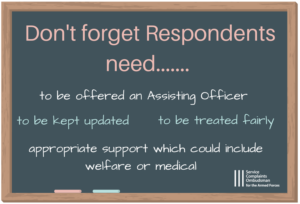When discussing the Service complaints process, people often focus on the complainant and the complaint handler. We want to ensure the complainant has the support they require and the complaint handler the knowledge and resources to investigate and decide the matter in a timely manner.

When discussing the Service complaints process, people often focus on the complainant and the complaint handler. We want to ensure the complainant has the support they require and the complaint handler the knowledge and resources to investigate and decide the matter in a timely manner. However, there are other people involved in the complaints process who also require support and who must not be overlooked in the process – respondents.
Service complaints aren’t always about another person. But when they are it must be remembered that both parties to the complaint will require support. I have often said that at the heart of every Service complaint is an individual who believes they were wronged. When that complaint is been about another person the converse is true – that at the end of the complaint is a person who, most likely, believes they have not done anything wrong. Therefore, both parties are likely to find the process stressful.
These stresses are exacerbated when things go wrong, the complaint takes longer to resolve than it should or it starts to have an impact on someone’s personal life or ability to do their job.
In addition to the support that should be provided within the internal system, complainants have the statutory right to come to my office at various stages in the complaints process[1]. However, respondents have no corresponding right. This was an issue I discussed in my blog in May 2016 and again in my Annual Report for that same year.
Both times I felt compelled to raise this issue following contacts from respondents. In most instances they were seeking to have my office investigate alleged undue delay in the handling of a complaint in which they were named. In each case, individuals were left exceptionally frustrated when they discovered that I, as the Ombudsman, had no legal power to assist respondents. They were left more frustrated to find out that their only option was to submit a Service complaint of their own about how they were treated/the impact the process has had on them – an option only open to individuals who were still serving.
The feedback received by my office about this was that it was unfair. Some people were confused about why the “Service Matter” provisions didn’t apply to respondents and many questioned how the requirement to make a Service complaint fitted in with the reformed process. I heard this from individuals who were respondents in complaints and also Commanding Officers who were charged with handling those complaints.
This sought to highlight the impact undue delay can have on respondents to a Service complaint, especially when they have limited support. In my Annual Report 2016, recommendation 1.2 looked at this issue and called for clearer direction on the responsibilities owed to respondents as part of the process.
Recommendation 1.2: That all Service complaints policy, including JSPs 831 and 763, whether owned by the Ministry of Defence or the individual Services, is reviewed by the end of 2017 to ensure that more detail is provided about the role of respondents in the process and when/how Specified Officers, Decision Bodies etc. should be communicating with respondents throughout the life of the Service complaint and their duties/responsibilities towards them.
This recommendation was taken very seriously by the single Services, who had also expressed concern about the impact of the complaints process on those individuals named in complaints. Each of the Services has taken steps to improve the quality of information and support available to respondents. Both the Army and RAF have published leaflets which provide a guide for respondents on what support and communication they can expect throughout the process and have introduced a point of contact for questions, feedback and concerns. While not publishing a leaflet, the Naval Service has updated the information on their website to address these issues.
Despite this work, this unfortunately still remains an issue.
Throughout 2017 and into this year, my office has continued to be contacted by respondents who have been negatively affected by the Service complaints process and feel there is a lack of support for them during the complaints process.
These are all valid concerns and as I stated in my previous blog on this issue it is something that requires further consideration. I am committed to finding a solution that is fair to both respondents and complainants, as I know the single Services are too, and I am currently considering how I can address this in my forthcoming Annual Report.
[1] You can find out more about the Ombudsman’s specific powers on the OSCO website – https://www.scoaf.org.uk/making-an-application-to-the-ombudsman/types-of-applications/